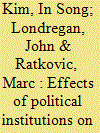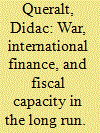|
|
|
Sort Order |
|
|
|
Items / Page
|
|
|
|
|
|
|
| Srl | Item |
| 1 |
ID:
169324


|
|
|
|
|
| Summary/Abstract |
Indiscriminate violence against civilians has long been viewed as a catalyst for new rounds of violence in civil wars. Can humanitarian assistance reduce violence after civilians have been harmed? Crossnational studies are pessimistic, drawing a connection between humanitarian aid and increased civil war violence, lethality, and duration. To date, however, we have few subnational studies of wartime aid and subsequent violence. To examine this relationship, I draw on the Afghan Civilian Assistance Program (ACAP II), a USAID-funded initiative that investigated 1,061 civilian casualty incidents (2011–13). Aid was assigned as if randomly to about half (55.8%) of these incidents, facilitating counterfactual estimation of how assistance affected Taliban attacks against the International Security Assistance Force, Afghan forces, and civilians. Challenging prior studies, I find that ACAP was associated with an average 23 percent reduction in attacks against ISAF, but not Afghan forces or civilians, at the village level for up to two years after the initial incident.
|
|
|
|
|
|
|
|
|
|
|
|
|
|
|
|
| 2 |
ID:
169319


|
|
|
|
|
| Summary/Abstract |
We present a model of political networks that integrates both the choice of trade partners (the extensive margin) and trade volumes (the intensive margin). Our model predicts that regimes secure in their survival, including democracies as well as some consolidated authoritarian regimes, will trade more on the extensive margin than vulnerable autocracies, which will block trade in products that would expand interpersonal contact among their citizens. We apply a two-stage Bayesian LASSO estimator to detailed measures of institutional features and highly disaggregated product-level trade data encompassing 131 countries over a half century. Consistent with our model, we find that (a) political institutions matter for the extensive margin of trade but not for the intensive margin and (b) the effects of political institutions on the extensive margin of trade vary across products, falling most heavily on those goods that involve extensive interpersonal contact.
|
|
|
|
|
|
|
|
|
|
|
|
|
|
|
|
| 3 |
ID:
169320


|
|
|
|
|
| Summary/Abstract |
Institutional constraints on executive behavior are commonly understood to be crucial constitutional features that limit state expropriation, protect property rights, and promote economic development. Combining new data describing the presence of parliamentary constraints for the entire European continent with data on city sizes, we build upon theories of endogenous economic growth to demonstrate that paths of both economic and political development over the long span of European history from 1200 to 1900 are the consequence of a common process of urban agglomeration. In doing so, we provide evidence that both outcomes—the existence of constraining institutions and growth—are driven by initial conditions that fostered technical know-how embodied in urban-dwelling artisans who, in turn, were able to force institutional limits on rulers’ actions. Hence, instead of reflecting a true underlying cause of development, parliamentary constraints are themselves outcomes determined by an endogenous process of growth.
|
|
|
|
|
|
|
|
|
|
|
|
|
|
|
|
| 4 |
ID:
169321


|
|
|
|
|
| Summary/Abstract |
One goal of the law is to provide a means to return disputing parties to cooperation. The prevailing expectation is that international investment law largely does not do this; rather, an aggrieved foreign investor sues the host state as a last resort and divests. I use a new database of Investor-State Dispute Settlement (ISDS) arbitrations and firm-level bilateral investment to show that, in fact, claimant investors reinvest in the host state at least 31 percent of the time (between 1990 and 2015). Among investors who file for arbitration, and controlling for sector, important correlates of reinvestment include the claimant's legal strategy; the extent of the claimant's grievance and success; and the incidence of post-arbitration litigation. Despite unique aspects of its institutional design, the de facto international investment regime can help solve host state time-inconsistency problems consistent with standard expectations of law. Whether the probability of reinvestment is high enough to reinforce host state commitments to this controversial regime is an open question.
|
|
|
|
|
|
|
|
|
|
|
|
|
|
|
|
| 5 |
ID:
169322


|
|
|
|
|
| Summary/Abstract |
More than 3,000 international investment agreements (IIAs) provide foreign investors with substantive protections in host states and access to binding investor-state dispute settlement (ISDS). In recent years, states increasingly have sought to change their treaty commitments through the practices of renegotiation and termination, so far affecting about 300 IIAs. The received wisdom is that this development reflects a “backlash” against the regime and an attempt by governments to reclaim sovereignty, consistent with broader antiglobalization trends. Using new data on the degree to which IIA provisions restrict state regulatory space (SRS), we provide the first systematic investigation into the effect of ISDS experiences on state decisions to adjust their treaties. The empirical analysis indicates that exposure to investment claims leads either to the renegotiation of IIAs in the direction of greater SRS or to their termination. This effect varies, however, with the nature of involvement in ISDS and with respect to different treaty provisions.
|
|
|
|
|
|
|
|
|
|
|
|
|
|
|
|
| 6 |
ID:
169318


|
|
|
|
|
| Summary/Abstract |
In this article I revisit the relationship between war and state making in modern times by focusing on two prominent types of war finance: taxes and foreign loans. Financing war with tax money enhances the capacity to assess wealth and monitor compliance, namely fiscal capacity. Tax-financed war facilitates the adoption of power-sharing institutions, which transform taxation into a non-zero-sum game, carrying on the effect of war in the long run. Financing war with external capital does not contribute to long-term fiscal capacity if borrowers interrupt debt service and, as part of the default settlement, war debt is condoned or exchanged for nontax revenue. The empirical evidence draws from war around the world as early as 1816. Results suggest that globalization of capital markets in the nineteenth century undermined the association between war, state making, and political reform.
|
|
|
|
|
|
|
|
|
|
|
|
|
|
|
|
| 7 |
ID:
169323


|
|
|
|
|
| Summary/Abstract |
What type of trade agreement is the public willing to accept? Instead of focusing on individual concerns about market access and trade barriers, we argue that specific treaty design and, in particular, the characteristics of the dispute settlement mechanism, play a critical role in shaping public support for trade agreements. To examine this theoretical expectation, we conduct a conjoint experiment that varies diverse treaty-design elements and estimate preferences over multiple dimensions of the Transatlantic Trade and Investment Partnership (TTIP) based on a nationally representative sample in Germany. We find that compared to other alternatives, private arbitration, known as investor-state dispute settlement (ISDS), generates strong opposition to the trade agreement. As the single most important factor, this effect of dispute settlement characteristic is strikingly large and consistent across individuals’ key attributes, including skill levels, information, and national sentiment, among others.
|
|
|
|
|
|
|
|
|
|
|
|
|
|
|
|
|
|
|
|
|